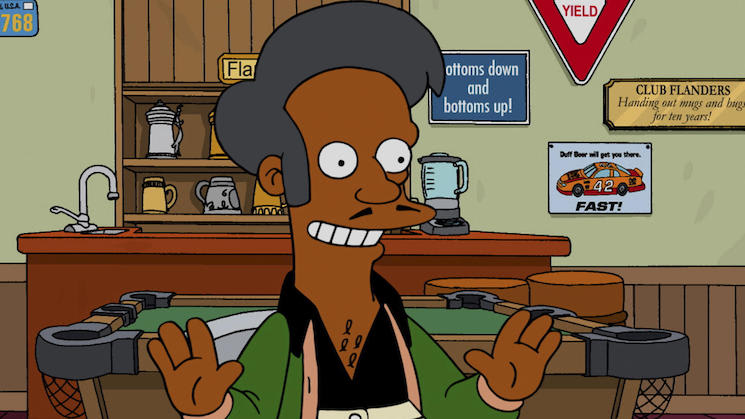Last year, Hari Kondabolu exposed the racism of The Simpsons with his thought-provoking documentary The Problem with Apu. Since then, it's been a real rollercoaster of responses. The show attempted to reply with a throwaway line that did not go over too well, then Hank Azaria said he was willing to step down from the role. Now, creator Matt Groening has given his two cents on the situation.
Earlier this year, Groening was quoted by USA Today as saying it's a "time in our culture where people love to pretend they're offended." In a new interview with the New York Times, Groening said he wasn't referring to Apu but culture in general with those comments.
"I think particularly right now, people feel so aggrieved and crazed and powerless that they're picking the wrong battles," he said.
"Well, I love Apu," he said. "I love the character, and it makes me feel bad that it makes other people feel bad. But on the other hand, it's tainted now — the conversation, there's no nuance to the conversation now. It seems very, very clunky. I love the character. I love the show."
He added that his intention in naming the character Apu was to raise awareness about Satyajit Ray's Apu trilogy.
"I love Indian culture and Indian film and Indian music," he said. "I thought that the name was a signal that we had, at least, a scholarly intention. I thought maybe a kid was going to grow up and find out what the name came from and go watch the Apu trilogy, which are the greatest films, basically, in the history of cinema."
Then Groening responded directly to Kondabolu's documentary.
"My guess is I agree, politically, with 99 percent of the things that Hari Kondabolu believes," he said. "We just disagree on Apu. I love the character and I would hate for him to go away.
"I am sorry that The Simpsons would be criticized for having an Indian character that, because of our extraordinary popularity — I expected other people to do it. I go, maybe he's a problem, but who's better? Who's a better Indian animated character in the last 30 years? I've been to India twice and talked about The Simpsons in front of audiences. That's why this took me by surprise. I know Indians are not the same as Indian-Americans."
Read the full interview with Matt Groening here.
Earlier this year, Groening was quoted by USA Today as saying it's a "time in our culture where people love to pretend they're offended." In a new interview with the New York Times, Groening said he wasn't referring to Apu but culture in general with those comments.
"I think particularly right now, people feel so aggrieved and crazed and powerless that they're picking the wrong battles," he said.
"Well, I love Apu," he said. "I love the character, and it makes me feel bad that it makes other people feel bad. But on the other hand, it's tainted now — the conversation, there's no nuance to the conversation now. It seems very, very clunky. I love the character. I love the show."
He added that his intention in naming the character Apu was to raise awareness about Satyajit Ray's Apu trilogy.
"I love Indian culture and Indian film and Indian music," he said. "I thought that the name was a signal that we had, at least, a scholarly intention. I thought maybe a kid was going to grow up and find out what the name came from and go watch the Apu trilogy, which are the greatest films, basically, in the history of cinema."
Then Groening responded directly to Kondabolu's documentary.
"My guess is I agree, politically, with 99 percent of the things that Hari Kondabolu believes," he said. "We just disagree on Apu. I love the character and I would hate for him to go away.
"I am sorry that The Simpsons would be criticized for having an Indian character that, because of our extraordinary popularity — I expected other people to do it. I go, maybe he's a problem, but who's better? Who's a better Indian animated character in the last 30 years? I've been to India twice and talked about The Simpsons in front of audiences. That's why this took me by surprise. I know Indians are not the same as Indian-Americans."
Read the full interview with Matt Groening here.
